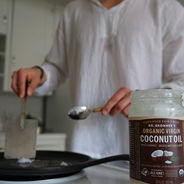A Master Plan to Intermittent Fasting: The Simple Science & To-Dos
- Christian Van Camp

- Mar 1, 2021
- 7 min read
Whenever something goes mainstream in the nutrition realm, suspicions spiral in my galactic noggin: Is this as good as it’s hyped up to be? Are there efficacious clinical trials on this? I’m a pretty skeptical guy, kind of like Bill Nye & I won’t buy into something until I‘ve attempted it myself or read the legit science.
There is no debate IF is a top trend in society right now. The science is there, Bill. IF combats many signs aging by reducing oxidative stress, supports fat burnin’ & gives your digestive tract some critical time to redial. Don’t believe me? Read on.

To start off, what is Intermittent Fasting (IF)?
Simply put, it is consuming calories during a specific period of the day and fasting the rest. This means basically no calories at all during the fasting period because this energy intake will stimulate some metabolic response, and cut you out of autophagy (cellular cleanup) and depending on the food source, can diminish fat burning.
Let's make this clear, it is not a diet. This is a continuous lifestyle choice.
That means in order to see significant results, you must cultivate adherence.
Most people, including myself, prefer the 16:8 protocol instead of the 5:2. The 5:2 style consists of 5 days where you eat any time of day, then minimize calories significantly (~500 calories) for the other 2 days of the week. In 16:8 you will eat your meals during an 8-hour period then fast the remaining 16 hours. For example, you could eat your last meal at 8pm.... sleep.... wake.... then when 2pm strikes the clock, you will fill your plate again. I find this the easiest one to adapt to because you sleep through roughly half of the fasting period.
IF is a solid strategy for fat loss because the increased satiety, or fullness, during the short eating window. This will cause you to eat less calories; therefore, fat reduction in the long run. The hormone ghrelin (I like to call 'growlin,' because it makes our tummy super pissed off) decreases significantly therefore lessening the harmful food cravings. This makes intermittent fasting perfectly suitable for someone trying to lose some stubborn fat.

Unfortunately, our western culture constantly forms a plethora of false ideas on health and wellness, many of which turn out to be total pseudoscience, or what I consider "bro science."
The media spews out lies upon lies on how to properly eat in order to boost longevity.
It's best to not accept information without doing the nitty-gritty research yourself. Assuming things can be toxic, and in the absence of complete information, you must fill in the blanks yourself.
Sometimes we fill in the blanks with our own interpretation of what you have heard, not based on an objective truth. The key is to not believe all you hear until you read the cold hard facts first.
I'll have conversations that ignite questions like, "Shouldn't you spread 5 meals throughout the day to keep your metabolism up?" or "Don't you lose muscle mass if you go without food for that long?"
No way! It’s silly nonsense. I'm sure some jacked Muscle-Milk-sponsoring dude (that looks like a laboratory chemical-loaded test-tube) endorsed this lousy logic.
What can I say, haters gonna hate (jk, I am here to spread light & love to you guys!)

FUN FAT FACT
Most individuals (90%+) do not experience muscle atrophy until well over 3 days of fasting, BUT it depends how much annoying lard the person is carrying around. Fat cells will always be targeted as a primary source of fuel in a fasted state well before muscle tissue (ketosis drives this phenomenon). This is your body's way of maintaining equilibrium, or homeostasis. If your body targeted muscle proteins after 14-16 hours... we'd be in a heap of trouble.
I base my understanding of health and wellness on modern science and paleolithic wisdom. Our ancestors went HOURS and HOURS, shit, even days or weeks scavenging for food. Take it way-way back thousands of years ago and there's no way we woke up and right away filled out plates and tummies with food. Basic physiology says otherwise. Cortisol is at its peak (our stress hormone) first thing in the morning, so it is best to naturally wake up to some water and salt, NOT to a yummy, sugary bowl of Frosted Flakes, a plate of scrambled eggs, and grease-drenched bacon.
This fact alone shows that intermittent fasting is ingrained in most human being's blood.

The burdening part of this discussion is how a chock-full of the studies on IF are conducted on rats. These studies display the amazing benefits of intermittent fasting from insulin sensitivity, weight loss, and blood pressure/cholesterol improvements.
Although these rodents have been used for decades to test the effects of certain foods, supplements, and drugs, they simply aren't human, so different results will indeed emerge.
However, according to the National Center of Biotechnology Information (NCBI), a clinical trial found in HUMAN BEINGS "found that modest weight losses of 5%-10% [from IF] have been associated with significant improvements in cardiovascular disease risk factors (ie, decreased HbA1C levels, reduced blood pressure, increase in HDL cholesterol, decreased plasma triglycerides) in patients with T2D" (Furmli). Even though this study is far from statistically significant (n<40) because it used only a measly three diabetic male patients, it tells us that massive improvements can occur with IF.
Patient 1 had type 2 diabetes for 25 years, patient 2 for 20 years, and patient 3 for 10 years. After eating a certain diet for so many yeats, one day, all of a sudden, they're told they must follow a 24-hour alternating day fast for over a month, but despite the challenge, they succeeded and amazing results came with it!
One patient did subjectively report that the "fasting was ‘easy’ and does not have the carbohydrate cravings he once had before he started the diet, and he also experienced higher energy levels.”
Adjusting to this fasting concept day-in and day-out offers profound glycemic control, aka less midnight munchies with Rocky Road ice cream AND less regretful despair in the morning.
If you can maintain healthy blood sugar, all other biomarkers will adjust to a healthy level accordingly. This leads to healthier food cravings, fat loss, improved brain function, and balances your hormones. Your precious microbiome will love you too, so you might as well go with your gut!
“With all these benefits, there must be some backlashes to IF, right?”

The only well-known harm through my research relates to women enacting this lifestyle-eating approach, and go figure, it's a study on rats.
Basically, most of the female rats experienced an odd hypothalamic reaction, due to the significant calorie restriction, over the course of 3 weeks. This caused a variety of reproductive hormonal issues relating to Luteinizing Hormone (LH) and Follicle-Stimulating Hormone (FSH) and when these hormones "cannot communicate with the ovaries, you run the risk of irregular periods, infertility, poor bone health and other health effects'' (Coyle).
BUT... there hasn't been any comparative studies with actual human beings. That just goes to show correlation doesn't equal causation.
To avoid this negative response and keep things ship-shape, I recommend you ladies out there just shorten the fasting period to 12 hours tops and/or have fewer fasting days in the week. That way you'll reap the benefits of us lucky buckos.
My Day-to-Day with Intermittent Fasting

I have been utilizing intermittent fasting since the beginning of 2018. Not eating food, as silly as it sounds, has boosted my digestive fire, cleared my skin, increased energy and drive, and powered my productivity.
I personally eat my last meal 2 hours prior to bed. I enjoy a snazzy amount of healthy fats from avocados, nuts/seeds, and oils in conjunction with a hefty amount of protein acquired through lean sources of chicken, hemp, beans/lentils, & grass-fed beef, or sometimes I'll just take the easy nutritional and tasty route by opting for a Purium Apple Berry shake in the Ultimate Lifestyle Transformation.

I typically like to devour 80% of my daily carbohydrate load, from sweet potatoes to quinoa, during this final end-of-the-day huzzah. With this approach I can earn that perfectly timed glycogen restoration after an intense weight-lifting session in the evening.
Prior to sleep, I pour a tbsp or two of the anti-aging Apothecherry in a wine glass, dilute with some filtered water, and hit the zzzzzs. Tart cherry juice is PACKED with naturally-occurring melatonin and antioxidants, great for a night of deeeeep dreamin’.
The next day, 12-16 hours thereafter, I will intuitively break my fast with a handful of cleansing Super Amino 23 pills, Biome Medic and Apple Berry Powershake (all which are found in the 30-day Ultimate Lifestyle Transformation I just mentioned above. Get a massive discount with the code cvcwellness! $440+ value for only $330. WOW! Don’t wait!).

In the morning, my breakfast consists of 2 big glasses of pure, filtered, quenching H2O tied with a tablespoon of apple cider vinegar. This kick starts the digestive system and can blunt your hunger for the day. Then, I will grind fresh organic coffee beans, dump the grounds in my French press, and prepare 1-2 cups of supreme bean for a focused day ahead.
Coffee does cause an extremely minimal enzymatic response by the liver; however, I don't consider it pernicious. This jammin' java also lifts your mood and boosts metabolism (just try not to exceed 3-4 cups per day to avoid draining your adrenal glands).
I also love to sip on some sparkling water (S.Pellegrino is my favorite) to ward off hunger signals and to quench thirst. These types of natural waters also contain trace amounts of minerals, which is perfectly suitable when in a fasted state.
The one setback to IF is the adjusting period.
People think I am crazy when I mention that I do IF daily because they are so accustomed to their constant eating and can't imagine going over 8 hours without snacking. So that is why I recommend for optimal progress, start with 10 hours fasted, then 11, then 12, and so on.
The micro adjustments eventually mesh into macro changes!
Once you surpass the stomach barks at 16 hours, you'll realize you can even prolong it to 18 or 20 hours with no problem! Patience and mental grit are key.
If you truly want change, don't think of the end result; such as the imaginary thin and lean you.
Think of the present you.
Think of the daily development & progress.
You have all to gain, and nothing to lose (besides fat, stress and inflammation)!
If you have any questions or concerns, or need some accountability, hit my line cvc.wellness.connect@gmail.com and I would be stoked to support you!

Coyle, D., APD. (2018, July 22). Intermittent Fasting For Women: A Beginner's Guide. Retrieved from https://www.healthline.com/nutrition/intermittent-fasting-for-women#effects-on-women
Furmli, S. (2018, October 09). Therapeutic use of intermittent fasting for people with type 2 diabetes as an alternative to insulin. Retrieved from https://www.ncbi.nlm.nih.gov/pmc/articles/PMC6194375/
Tello, M. (2018, June 26). Intermittent fasting: Surprising update. Retrieved from https://www.health.harvard.edu/blog/intermittent-fasting-surprising-update-2018062914156

































Doctor Daktari Babu nyuki traditional healer call now WhatsApp +254798920185 consultional pay now